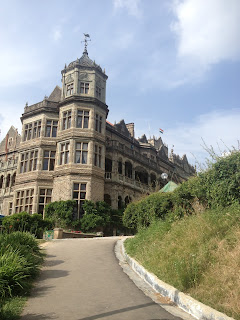Where the mind is without fear and the head is
held high
Where knowledge is free
Where the world has not been broken up into fragments
By narrow domestic walls
Where words come out from the depth of truth
Where tireless striving stretches its arms towards perfection
Where the clear stream of reason has not lost its way
Into the dreary desert sand of dead habit
Where the mind is led forward by thee
Into ever-widening thought and action
Into that heaven of freedom, my Father, let my country awake
Where knowledge is free
Where the world has not been broken up into fragments
By narrow domestic walls
Where words come out from the depth of truth
Where tireless striving stretches its arms towards perfection
Where the clear stream of reason has not lost its way
Into the dreary desert sand of dead habit
Where the mind is led forward by thee
Into ever-widening thought and action
Into that heaven of freedom, my Father, let my country awake
There are often
times when we wonder about the problems that have plagued our country and end
up so tangled in the thought of them that we drop into the pit of cynicism. The
big bad words flash before our eyes everyday – corruption, rape, terrorism,
drugs, and dirty politics, just to name a few. We find our dear journalists
struggling to say the same story with different names as if it was the most
horrendous thing they’d ever heard. On the receiving end, it is perpetual déjà
vu.
One cannot
blame either for we have gotten into a death dance, a vicious cycle (if I may
call upon this overused expression) or as Tagore would say - lost our way into
the dreary desert sand of dead habit. Often when we have a long list of tasks
to accomplish we make to-do lists for ourselves. The humble to-do list can be
called a sad by-product of the human habit of forgetting things, things which
are sometimes very important. A list gives us perspective when we are lost in
the alleys of a supermarket dazed by products wrapped in every colour of the
rainbow. We realize what is important and what can wait.
Maybe the
common man today is lost in that part of the supermarket of where they sell
things like gloom, hopelessness, cynicism and despair. At such a time it
wouldn’t be a bad idea to take a look at the to-do list which our forefathers
made while fighting for the freedom of our country. Why were they fighting the
British anyway? Why not just live in complacency? One of the reasons I believe
was that they realized that there was something about the British rule which
was fundamentally against the flourishing of India as a country, breathing,
thinking and acting on its own based upon its own ideas of what was right and
wrong. They had a vision, a dream, for India. That vision was their list which
we inherited. Sadly, for our part we have done a pretty bad job with it. This
particular poem by Tagore is part of that inheritance. It is a dream within a
nightmare. A lot of people would find it of little use beyond poetry recitals
but I insist stubbornly that each and every verse in this poem can and will be
achieved if only we start working towards it.
This poem
should serve as a wakeup call for every couch critic, every teacher, social
worker, politician, every Indian out there. It is human to get lost in despair
but it is equally human to gravitate towards hope and to realize it through
action. I don’t have to write a summary of the poem for you. You already know
it – it is your to-do list and now that you have seen it, it is time that you
rejuvenate and remove yourself from the shelves which contain jars of despair
and packets of gloom. Maybe you won’t be able to complete the job but you would
make it much easier for your son or your grandson.
(Contributed by:-Monib Ahmed)
(Contributed by:-Monib Ahmed)


